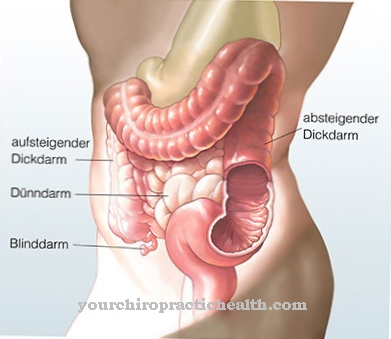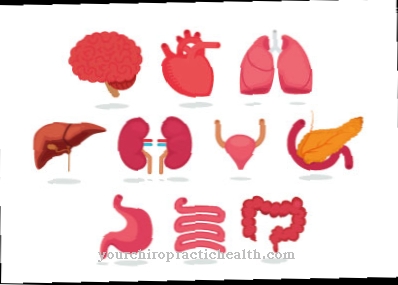The Pituitary Insufficiency is an underactive pituitary gland. Since messenger substances for other hormonal glands are produced in the pituitary gland, there is a general hormone deficiency in case of insufficiency. The causes are either in the pituitary gland itself or in the hypothalamus.
What is pituitary insufficiency?

© bilderzwerg - stock.adobe.com
In the Pituitary Insufficiency Not enough hormones are produced in the anterior lobe of the pituitary gland. The secretion of stimulating hormones for the thyroid gland, the adrenal cortex and the gonads is thus limited. These hormones are in particular growth hormones, LH, TSH, FSH and ACTH. As a result of the reduced stimulation of the adrenal cortex, the gonads and the thyroid, fewer hormones are also produced in these glands.
The most important hormones of the adrenal cortex are the stress hormones adrenaline and noradrenaline. The best-known thyroid hormones are thyroxine and calcitonin, while sex hormones are primarily produced in the gonads. Pituitary insufficiency is therefore associated with a corresponding number of complaints. The entire hormonal balance is imbalanced as part of the disease, as the secretion of the pituitary gland regulates the release of various hormones.
Pituitary coma is a special form of insufficiency. A sudden failure of the pituitary gland causes the thyroid gland and the adrenal cortex to come to a standstill from one second to the next.
causes
Various phenomena are possible causes of pituitary insufficiency. Tumors in this area or in the area of the hypothalamus, for example, can impair the secretion of the pituitary hormone. Inflammation in the pituitary gland or the hypothalamus can also cause insufficiency. Likewise, autoimmune diseases and strokes sometimes lead to pituitary insufficiency.
Causal injuries are also conceivable. Traumatic brain injuries in particular can play a role in the insufficiency. Many of these trauma are birth trauma as a result of a breech birth. Injuries can also occur as a result of operations or the radiation of brain tumors. Another cause of hypophyseal hypofunction can be brain necrosis, as it occurs, for example, in the context of Sheehan's syndrome.
In some cases, the cause of pituitary insufficiency remains unclear. This means that at the current state of research, not all connections are known and the disease has not yet been fully researched. Pituitary coma is usually always caused by an accident or a sudden injury to the pituitary gland.
Symptoms, ailments & signs
The symptoms of pituitary insufficiency are varied. Usually only the anterior lobe is affected by the insufficiency. Insufficiency of the entire pituitary gland is less common. Growth disorders such as short stature are one of the key symptoms. Since the fat metabolism slows down due to the hormone deficiency, obesity can also occur.
In women, these symptoms are usually accompanied by disorders of the menstrual cycle, as the sex hormone estrogen is no longer produced in sufficient quantities. The development of secondary sexual characteristics can also be inhibited because of this hormone deficiency. Often there is also diabetes insipidus.With this disease there is an increased feeling of thirst. Patients urinate more often.
Which symptoms a patient with pituitary insufficiency has in addition to these key symptoms can vary significantly. In principle, the occurring disorders result from the physiological effect of the respective hormone deficiency in gonadal, adrenal cortex and thyroid hormones. In a pituitary coma, there is a lack of drive and a slow pulse. Body temperature drops and those affected lose consciousness.
Diagnosis & course of disease
The diagnosis begins with hypophyseal function with a comprehensive anamnesis. On the basis of the anamnesis, the doctor can find out, for example, treatments or diseases that may have caused the hypofunction. The doctor determines the amount of growth hormone, LH and FSH, the thyroid stimulating hormone, the adrenocorticotropic hormone and the prolactin in the blood.
In addition, a urine or blood test to determine the sex hormones, the thyroid hormones and the glucocorticoids are carried out. The doctor uses a stimulation test to narrow down the localization of the damage. If the disturbance is from the hypothalamus, then the stimulation test results in the production of hormones.
The hypothalamus messengers that stimulate the pituitary gland are put into the body during this test. An imaging method can be ordered to determine the cause more precisely. The prognosis for pituitary insufficiency is usually favorable, as the phenomenon can now be treated well. The pituitary coma, however, can be life threatening.
Complications
First and foremost, the pituitary insufficiency leads to disturbances in growth and thus to a short stature. In most cases, this shows up at a young age. There are also metabolic disorders, so that most patients also suffer from obesity and thus from obesity.
In women there are menstrual disorders and other sexual disorders and thus a delayed onset of puberty. Diabetes does not set in, which is why most patients suffer from increased thirst. The patient's resilience also drops drastically and physical exertion can lead to a loss of consciousness. This is often associated with paleness and a very low pulse.
Pituitary insufficiency can be treated in different ways, with the treatment option usually depending on the cause of the disease. In most cases, either the tumor or the inflammation must be removed, but there are no particular complications. The earlier the disease is diagnosed and treated, the higher the chances of a complete cure for the patient.
When should you go to the doctor?
Since pituitary insufficiency does not improve the symptoms and thus does not heal itself, a doctor must be consulted in any case with this disease. The complaints can be very different, so that no general prediction can be made about them. However, if they occur over a longer period of time and make life difficult for the person concerned, an examination should always be carried out by a doctor.
Disturbances in growth can indicate the disease. Many patients suffer from short stature and from a disturbed lipid metabolism, so that obesity can also occur. Diabetes can also indicate the disease. A doctor should be consulted if the patient has a slow pulse and decreased exercise capacity.
First and foremost, a general practitioner can be seen in the case of pituitary insufficiency. They can examine the symptoms and continue to diagnose the disease. For further treatment, examinations by other specialists are usually necessary.
Doctors & therapists in your area
Treatment & Therapy
The therapy for pituitary insufficiency depends on the cause of the disease. For example, tumors must be removed in an operation. Depending on the malignancy, the operation may be combined with radiation therapy. In inflammatory processes, cortisone is usually administered to allow the inflammation to subside. If the cause of the insufficiency cannot be determined, hormone replacement therapy is usually used.
Which hormones must be taken depends heavily on the extent of the insufficiency. Above all, the intake of correctly dosed glucocorticoids is vital. The dosage of these stress hormones must be increased as soon as the patient is under stress. Failure to increase the dose in this way can have life-threatening consequences. Just in case, all patients with glucocorticoid deficiency should have an emergency ID card with them.
The intake of growth hormones is also often part of the therapy for pituitary insufficiency. The same goes for the administration of sex hormones. As a rule, the missing hormones in the case of pituitary insufficiency of unexplained cause are taken for life. Only in the case of a lack of prolactin and oxytocin does not have to replace hormones.
prevention
Pituitary insufficiency can be prevented indirectly, for example by adequately clarifying traumatic brain injuries.
Aftercare
In the case of pituitary insufficiency, follow-up care begins four to six weeks after the date of surgery. After the actual therapy, drug treatment takes place. In connection with this, precise control of the drug setting and the health of the patient is required. The individual dose will be adjusted over time.
Basically, there are no noticeable changes in those affected after a few years. If the condition is related to an infection, such as a pituitary gland inflamed by bacteria, it is important to strengthen the immune system. This type of aftercare focuses on improving the healing process and is also used for prevention.
Strengthening the immune system can be ensured through a balanced diet with lots of natural foods. Regular physical activity is also useful. Ideally, there will be frequent alternation between tension phases and relaxation breaks. In this way, the patients can break down the accumulated stress hormones particularly well.
At the same time, active relaxation helps to successfully combat the pathogenic germs. As part of a better body awareness, patients learn to be mindful. This plays an essential role in the healing process. Efficient aftercare ensures stable health and better well-being.
You can do that yourself
The pituitary or pituitary gland has a major influence on the control of various body functions. It can be seen as one of the most important hormonal control centers in the body. It performs its control function through the production of control hormones or directly effective hormones. This means that a pituitary insufficiency, depending on its severity, has considerable effects on certain body functions and on the psyche.
A detected pituitary insufficiency should be treated as soon as possible in the sense of combating the cause. There are hardly any known self-help measures. If the disease is due to inflammation of the pituitary gland by bacteria or other pathogenic germs, strengthening the immune system can support the healing process and has a preventive effect against a new infection.
The immune system can be strengthened through a varied diet that also includes natural foods, regular exercise and constant alternation between tension and relaxation phases. For example, stress hormones that can accumulate over the course of the day if no active relaxation phases have been interposed can be reduced more effectively through light exercise than through relaxation on the sofa. The immune system is strengthened and can fight pathogenic germs much more effectively.
An adaptation of the behavior in everyday life to a pituitary insufficiency consists in consciously perceiving the existing symptoms and, above all, avoiding dangerous situations that can arise from various hormone-related deficits.





.jpg)





















